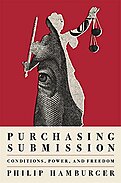When the state offers money, licenses, or other benefits (such as reduced sentences) with “strings” attached, that’s a powerful method of government control. The federal government increasingly uses this method to induce states, localities, and private parties to submit to conditions of its choosing. And yet this formidable power can enable it to sidestep vital limits that would otherwise apply to its authority. For example, it can secure submission to rules that it would lack the constitutional power to order directly or that would otherwise be subject to the checks and balances of the political process.
Courts and lawyers have brought to bear on this problem the theory of “unconstitutional conditions,” but in Purchasing Submission, renowned legal scholar Philip Hamburger argues that a broader critique is needed if we are to protect liberty and rein in the danger of arbitrary power. Please join us for a lively discussion of a new book by one of today’s preeminent constitutional thinkers.




